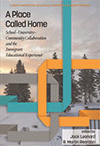
A Place Called Home
School-University-Community Collaboration and the Immigrant Educational Experience
Edited by:
Jack Leonard, University of Massachusetts Boston (retired)
R. Martin Reardon, East Carolina University
A volume in the series: Current Perspectives on School/University/Community Research. Editor(s): R. Martin Reardon, East Carolina University. Jack Leonard, University of Massachusetts Boston (retired).
Published 2021
Describing global trends in forced displacement in 2019, Filippo Grandi, United Nations High Commissioner for Refugees declared that “we are witnessing a changed reality in that forced displacement nowadays is not only vastly more widespread but is simply no longer a short-term and temporary phenomenon”. At the end of 2019, almost 80 million people had been forced to leave the place they called home “as a result of persecution, conflict, violence, human rights violations or events seriously disturbing public order,” according to the United Nations High Commission for Refugees.
This volume presents the concerted efforts of chapter contributors to alleviate the alienation of those who have been displaced and help them to feel at home in the country in which they have sought refuge. Chapter contributors highlight their endeavors specifically with Latino, Hmong, and African immigrants in the United States and Canada, as well as with a veritable united nations of immigrant identities in general. Endeavors oriented to making immigrants feel at home inevitably raise the vexed question of what it means to be a good member of a society—regardless of whether one is a citizen.
CONTENTS
Introduction. Harnessing the Power of Family Leadership for Immigrant Students, Aurelio M. Montemayor and Nancy Feyl Chavkin. Embroidering Collaboration Across University, Community, and School Contexts: The Hmong Children’s Longitudinal Study, Zha Blong Xiong, Malina Her, Lillie Lee, and Choua Yang. A Holistic Approach to Strengthening the Home/School/University Partnership in Support of Refugee Students, Rui Niu-Cooper, Lisa McManus, and Raul Ysasi. Examining How Partnerships in a Full-Service Community School Influence the Educational Experiences of Immigrant and Refugee Youth, Kathleen Provinzano, Kristin L. K. Koskey, and Toni Sondergeld. Cultivating a Sense of Place for and With Immigrant Students Through University, School, Community Partnerships, Amanda Eppley, Myrna Ortiz Villar, and Deborah McKoy. Building Parent-School Partnerships Through the Hispanic Parent Leadership Academy, Daniela M. Susnara, M. Blake Berryhill, Elizabeth K. Wilson, and Andrea Ziegler. Citizenship: Community Engagement and Community Change, Carolyn Colvin, Dan Stevenson, and Richard Barajas. University and Charter System Partnership: Using Equity Based Design Improvement to Build Community Capital, Doris Candelarie, Janet Filbin, and Rachel Kamnkhwani. The Intricate Nature of 21st Century Students: Exploring Intersectionality and Persistence Among Immigrant Students at Canadian Universities, Alyson E. King, Nawal H. Ammar, and Susan M. Brigham. The King County Play Equity Coalition: Focusing on Increasing Youth Physical Activity Through School-University-Community Collaboration, Julie McCleery and Katharine Olsen. Improving Educational Access and Outcomes of Latinx Students: A Critical Collaboration, Charlotte R. Hancock and Greg A. Wiggan. About the Authors.
-
Paperback978-1-64802-540-2
Web price: $45.04 (Reg. 52.99)
-
Hardcover978-1-64802-541-9
Web price: $80.74 (Reg. 94.99)
- eBook978-1-64802-542-6

- EDU020000 - EDUCATION: Multicultural Education
- EDU048000 - EDUCATION: Inclusive Education
- EDU034030 - EDUCATION: EDUCATIONAL POLICY & REFORM: Federal Legislation
-
 Alleviating the Educational Impact of Adverse Childhood Experiences
School-University-Community Collaboration
Alleviating the Educational Impact of Adverse Childhood Experiences
School-University-Community Collaboration
-
 Innovation and Implementation in Rural Places
School-University-Community Collaboration in Education
Innovation and Implementation in Rural Places
School-University-Community Collaboration in Education
-
 Integrating Digital Technology in Education
School-University-Community Collaboration
Integrating Digital Technology in Education
School-University-Community Collaboration
-
 Learning to Read the World and the Word
School-University-Community Collaboration to Enrich Immigrant Literacy and Teacher Education
Learning to Read the World and the Word
School-University-Community Collaboration to Enrich Immigrant Literacy and Teacher Education
-
 Making a Positive Impact in Rural Places
Change Agency in the Context of School-University-Community Collaboration in Education
Making a Positive Impact in Rural Places
Change Agency in the Context of School-University-Community Collaboration in Education
-
 School-University-Community Collaboration for Civic Education and Engagement in the Democratic Project
School-University-Community Collaboration for Civic Education and Engagement in the Democratic Project
-
 School-University-Community Research in a (Post) COVID-19 World
School-University-Community Research in a (Post) COVID-19 World

